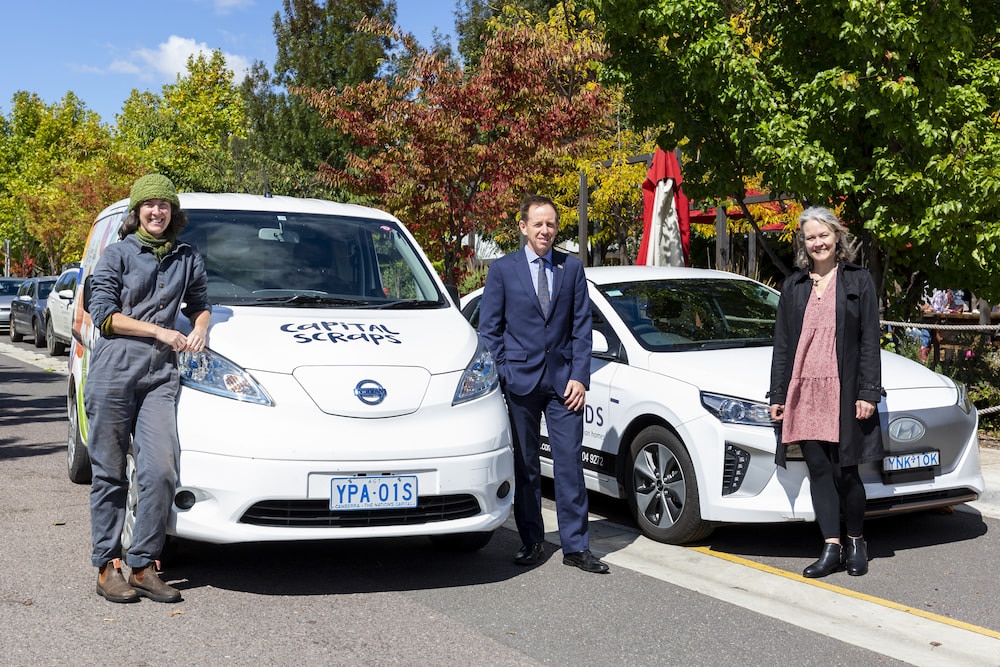Businesses bought half of all new zero-emission vehicles purchased in the ACT last year, and many more are thinking of buying electric vehicles for their fleet. To help them, the ACT Government has set up an advisory service.
“This is a free service that helps those with fleets of vehicles for their organisation to understand how to make the transition from a traditional fleet across to a zero-emission fleet,” said Shane Rattenbury, ACT Minister for Energy and Emissions Reduction.
“We’re at the start of the electric vehicle revolution… We know people have got lots of questions. There’s a lot of myths out there about electric vehicles, and this program makes it as simple as possible for businesses that want to be involved to make this transition.”
The government team will talk to a business or community organisation about what vehicles are available, what subsidies are available from the ACT Government (such as free registration or zero stamp duty), charging infrastructure, and the organisation’s needs, and help them develop a business case.
“These are all the questions that people commonly have,” Mr Rattenbury said. “This program helps the business work through those very practical, very real questions, and answer them in a way that they can then make that clear decision.”
- ACT electric vehicle drivers take part in smart charger trial
- ACT will accelerate transition to electric vehicles
- ACT leads the way for electric vehicles
- ACT electric vehicle owners celebrate 1,000th registration
- It’s inevitable: Free registration for the electric cars of the future
Transport emissions make up more than 60 per cent of Canberra’s greenhouse gas emissions, Mr Rattenbury stated. But transitioning to a zero-emission fleet was both good for the planet and good business sense, he argued.
“A lot of small businesses have had a difficult time through COVID – and so we’re hoping that we can help them make this transition to help the city and help their bottom line.”
Annette Braagaard, the Danish founder of Nordic Blinds, owns two electric vehicles, with a third on the way. They travel around Canberra, and to Sydney and the coast – and only need to charge once in Sydney.
Her business saves between $7,000 and $9,000 for every 50,000 km they travelled. But, Ms Braagaard said: “It wasn’t so much about saving money on petrol; it was more about saving the environment.”
She and her husband switched to electric vehicles because they were concerned their driving contributed to climate change.
“I would like to see a lot more businesses going to complete EV fleets, or even part fleets,” Ms Braagaard said. “I’ve got young teenage kids, and for their future, I would really like to see more people take up the EVs.”
Brooke Clinton, founder and manager of Capital Scraps Composting, says using an electric van was “a no-brainer”.
“Our business is all about climate action.” They collect food waste from households and other places. “It wouldn’t make sense for us to be cutting emissions in one activity and then putting out emissions through our transport options.”
They began with an electric trike, which they use as the mainstay of their business, then bought the van.
“We’re definitely not worried about the size of the battery in our vehicle, but it just makes so much sense to not have to rely on petrol.”
Mr Rattenbury said there was a general misapprehension that EV owners needed to spend a lot of money on charging infrastructure. But many owners simply have a bypass charger they plug in the wall; the vehicle charges overnight.
The ACT Government will also roll out 50 electric chargers across Canberra soon.
Many Canberra organisations and businesses had fleets, and the government was happy to talk to them – whether they had 10 vehicles or only one.
“There’s really no limit from the program’s point of view,” Mr Rattenbury said.
The government has already had 30 enquiries so far, while some organisations signed up before the launch.
The ACT Government wants all vehicles sold here to be electric by 2035, but Australia is seen as a tough market, due to lack of Federal government support. Scandinavian countries, meanwhile, lead the world; Norway became the first country in the world where more electric cars were sold than any other sort of vehicle, and plans to end the sale of fossil fuel vehicles by 2025.
Ms Braagaard believes Australia should be one of the world leaders.
“We’ve got the sun, we’ve got all the power in the world to actually be able to do it,” she said.
“We do need to increase, obviously, on charging stations around the country, but it’s there. It just needs to get better and more. And I think we can definitely get there.”
Canberra Daily would love to hear from you about a story idea in the Canberra and surrounding region. Click here to submit a news tip.



